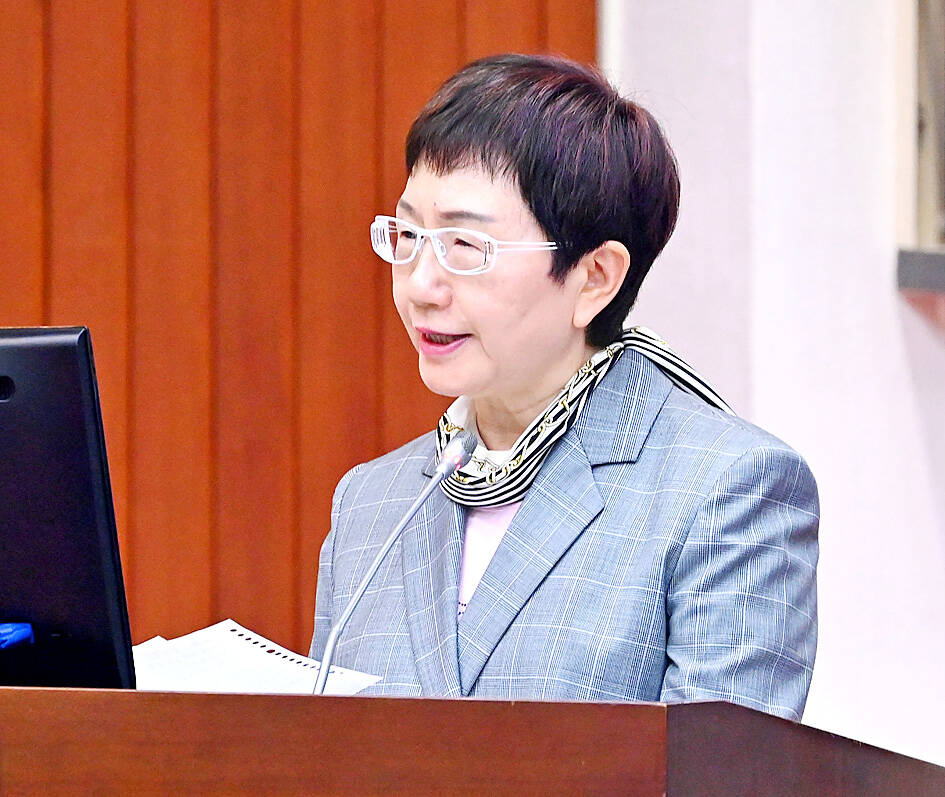The Ministry of Finance is open to discussions about lowering the business tax on the financial industry proposed by the Financial Supervisory Commission (FSC), Minister of Finance Chuang Tsui-yun (莊翠雲) said at a meeting of the legislature’s Finance Committee yesterday.
Taiwan raised the business tax rate on banks and insurance companies to 5 percent from 2 percent in 2014, with part of the tax revenue being allocated to a special reserve fund to buffer against potential risks or losses. From 2014 to last year, about NT$216.2 billion (US$6.71 billion at the current exchange rate) in business tax revenue had been allocated to the special reserve fund, ministry data showed.
As the relevant provisions are about to expire at the end of next year, FSC Chairman Thomas Huang (黃天牧) on Wednesday last week said he hoped to discuss with the finance ministry to return the business tax rate to at least the 2 percent level seen before 2014.

Photo: Chu Pei-hsiung, Taipei Times
Democratic Progressive Party (DPP) Legislator Michelle Lin (林楚茵) yesterday said a cut in the tax rate to 2 percent from 5 percent could help the financial industry save at least NT$25 billion to NT$30 billion a year and she asked what the finance ministry’s stance is.
In response, Chuang said her ministry would evaluate the pros and cons of the FSC proposal and submit a report within a month.
According to the ministry’s assessment, if the business tax rate is lowered to 2 percent and the tax revenue does not go into the reserve fund, but into the national coffers, it ends up contributing to the nation’s tax income, Chuang added.
Tax Administration Director-General Sung Hsiu-ling (宋秀玲) said she agreed that tax cuts would be positive for the financial industry overall, but what deserves further consideration is whether the reserve fund is sufficient should something go wrong.
The business tax for the financial industry in Taiwan covers four categories, with the rate set at 5 percent on banks and insurance companies, 2 percent on exclusive businesses other than banks and insurance firms, 1 percent on reinsurance premium income and 5 percent on other non-exclusive businesses.
Taiwan lowered the business tax rate on banks and insurance companies to 2 percent from 5 percent in 1999 following the Asian financial crisis and further cut it to zero in 2001 to support the local financial industry.
In 2005, the nation raised the rate to 2 percent to replenish the financial reconstruction fund, which was prevously established to clean up the bad loans of poorly run financial institutions, and in 2014 increased the rate to 5 percent, of which 2 percent went to the special reserve for the financial industry and 3 percent went to the national coffers.

CHIP RACE: Three years of overbroad export controls drove foreign competitors to pursue their own AI chips, and ‘cost US taxpayers billions of dollars,’ Nvidia said China has figured out the US strategy for allowing it to buy Nvidia Corp’s H200s and is rejecting the artificial intelligence (AI) chip in favor of domestically developed semiconductors, White House AI adviser David Sacks said, citing news reports. US President Donald Trump on Monday said that he would allow shipments of Nvidia’s H200 chips to China, part of an administration effort backed by Sacks to challenge Chinese tech champions such as Huawei Technologies Co (華為) by bringing US competition to their home market. On Friday, Sacks signaled that he was uncertain about whether that approach would work. “They’re rejecting our chips,” Sacks

Taiwan’s long-term economic competitiveness will hinge not only on national champions like Taiwan Semiconductor Manufacturing Co. (TSMC, 台積電) but also on the widespread adoption of artificial intelligence (AI) and other emerging technologies, a US-based scholar has said. At a lecture in Taipei on Tuesday, Jeffrey Ding, assistant professor of political science at the George Washington University and author of "Technology and the Rise of Great Powers," argued that historical experience shows that general-purpose technologies (GPTs) — such as electricity, computers and now AI — shape long-term economic advantages through their diffusion across the broader economy. "What really matters is not who pioneers

TAIWAN VALUE CHAIN: Foxtron is to fully own Luxgen following the transaction and it plans to launch a new electric model, the Foxtron Bria, in Taiwan next year Yulon Motor Co (裕隆汽車) yesterday said that its board of directors approved the disposal of its electric vehicle (EV) unit, Luxgen Motor Co (納智捷汽車), to Foxtron Vehicle Technologies Co (鴻華先進) for NT$787.6 million (US$24.98 million). Foxtron, a half-half joint venture between Yulon affiliate Hua-Chuang Automobile Information Technical Center Co (華創車電) and Hon Hai Precision Industry Co (鴻海精密), expects to wrap up the deal in the first quarter of next year. Foxtron would fully own Luxgen following the transaction, including five car distributing companies, outlets and all employees. The deal is subject to the approval of the Fair Trade Commission, Foxtron said. “Foxtron will be

BUBBLE? Only a handful of companies are seeing rapid revenue growth and higher valuations, and it is not enough to call the AI trend a transformation, an analyst said Artificial intelligence (AI) is entering a more challenging phase next year as companies move beyond experimentation and begin demanding clear financial returns from a technology that has delivered big gains to only a small group of early adopters, PricewaterhouseCoopers (PwC) Taiwan said yesterday. Most organizations have been able to justify AI investments through cost recovery or modest efficiency gains, but few have achieved meaningful revenue growth or long-term competitive advantage, the consultancy said in its 2026 AI Business Predictions report. This growing performance gap is forcing executives to reconsider how AI is deployed across their organizations, it said. “Many companies